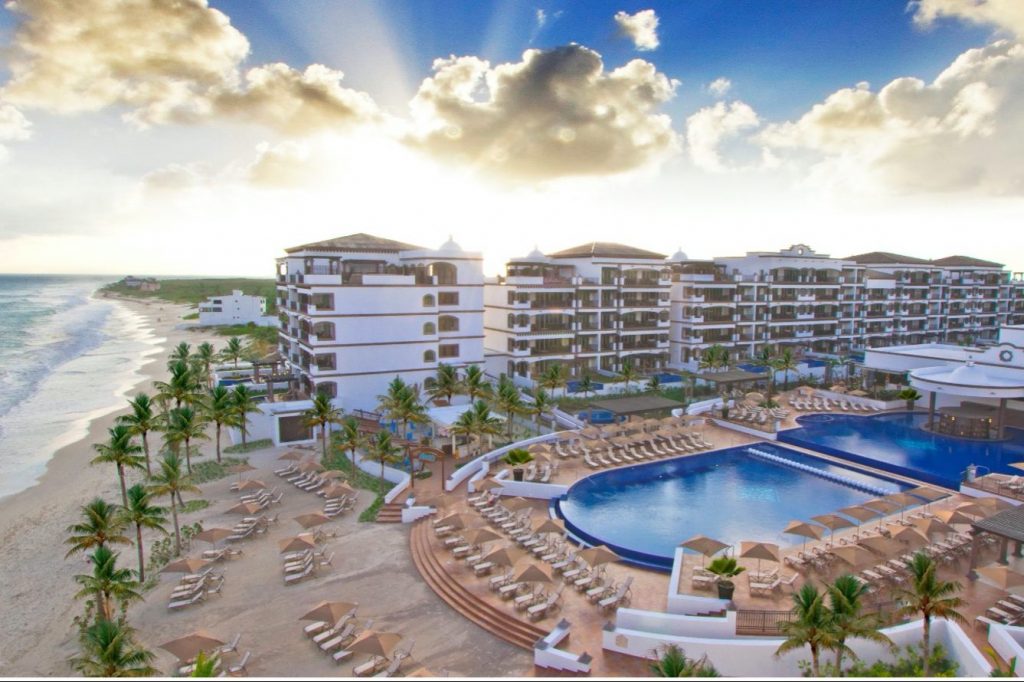Wyndham Finally Launches a Luxury Hotel Brand After Years of Thinking About It

Skift Take
Wyndham Hotels & Resorts is the latest hotel company to show it sees a growth opportunity in the luxury sector moving forward in the pandemic recovery.
The hotel company Wednesday launched Registry Collection Hotels, Wyndham’s 21st brand and one that will focus on luxury hotel owners seeking more of an independent feel. The soft brand’s — that is, one without a singular name or brand standards around design or amenities — first hotel is the Grand Residences Riviera Cancun in Mexico. Several additional properties are in various stages of development, and company leaders expect initial growth will focus on Latin America and the Caribbean.
However, Wyndham leaders eventually expect to add to its new luxury sector with properties in markets around the world and not necessarily just in resort settings.
“This is us planting our flag in the luxury space,” Leo Danese, a brand leader and vice president of operations at Registry Collection Hotels, told Skift in an interview ahead of the launch. “In the short-term, it will be more resort opportunities. But that's not to say that we're not talking to other owners in urban markets and internationally as well.”
Wyndham’s higher-end brands before Wednesday topped out at Wyndham Grand, seen by the industry more as an “upper-upscale” type of brand rather than one that competes with the like of Ritz-Carlton and St. Regis. Registry Collection Hotels is the company’s highest tier brand since the late real estate developer Trammell Crow founded the company in 1981.
Companies like Accor and IHG have signaled luxury brands offer a lot of upswing coming out of the pandemic, especially with travelers who have been lucky enough to save so much money during the health crisis.
Wyndham saw an opportunity to bring in a high-end brand and was working on its development for years, but don’t expect hundreds of these properties to debut anytime soon.
The company hopes to have between 20 and 25 properties in the Registry Collection of hotels within the next five years. The brand will likely grow through a mix of conversions — where owners of existing hotels take on the Registry Collection Hotels brand affiliation — and new construction.
By development comparison, Hilton CEO Christopher Nassetta said he was aiming for as many as 500 Tempo hotels within 10 years at the lifestyle hotel brand’s launch in early 2020.
“My job is to grow the brand, but I think we realized that it's in a luxury segment, and we want to be very mindful of the hotels that we bring on,” Danese said. “But I think we'll be surprised at how owners are receptive to this concept.”
Brand Overlap
Registry Collection Hotels is not to be confused with The Registry Collection, a luxury timeshare exchange offering at Travel + Leisure Co. — formerly known as Wyndham Destinations, which Wyndham spun off from in 2018.
There is currently only one property in the Registry Collection Hotels portfolio while there are more than 200 timeshare resorts under the branding used by Travel + Leisure Co. But the luxury appeal and independence of the timeshare exchange brand helped inform some of the development on the hotel side.
Wyndham’s decision to develop Registry Collection Hotels as a soft brand is yet another example of a global hotel company seeing growth opportunities in this type of deal where owners retain more autonomy around operations.
Hilton has soft brands like the Curio Collection and Tapesty Collection. Marriott has the Luxury and Autograph Collections. Choice Hotels, often seen as Wyndham’s direct competitor, has the Ascend Hotel Collection.
“We kind of err on the side of a collection brand because that gives us and the owners a little bit more flexibility to deliver that experience in their own unique way in their own unique market,” Danese said. “That gives us the most opportunities to grow and deliver those great experiences to our guests.”
Wyndham has found success with its soft brand approach with divisions like the Trademark Collection, the company’s division of more than 100 boutique hotels that launched in 2017. The appeal enables owners to largely retain the independent elements of their property while tapping into Wyndham’s distribution platform and loyalty program.
“Since the infancy of Trademark, I really don't think we anticipated to see the success that we have,” Danese said.
A Crowded Playing Field
Luxury may be a new brand frontier for Wyndham, but the company is going to have to reckon with a competitive landscape from day one.
Companies like Marriott and all-inclusive resort brand Sandals see major growth opportunities in the Caribbean and Latin America for luxury resorts. The Curator Hotel & Resort Collection, a group of independent hotels launched during the pandemic, has a similar growth plan by appealing to owners wanting enhanced distribution without the hassle of taking on a full brand agreement.
Wyndham leaders note the company’s midscale and economy brands like La Quinta and Days Inn remain the key driver of the company. But that doesn’t mean they aren’t going to be competitive and try to woo luxury hotel owners into a Registry Collection Hotels deal. Global distribution could be the biggest bargaining chip at the negotiating table.
“There are so many independent hotels that are coming out of [the pandemic] and may struggle a little bit because there are other branded hotels in their market,” Danese said. “For us to kind of partner on and really bolt on the back-end of our distribution system to some of these hotels, I've seen it firsthand with [the Trademark Collection] and why it's been so successful and why I'm so confident that we'll be able to be successful in this [luxury] space.”
[CORRECTION]: This story has been corrected to reflect Wyndham Hotels & Resorts spun off from Wyndham Destinations in 2018.




